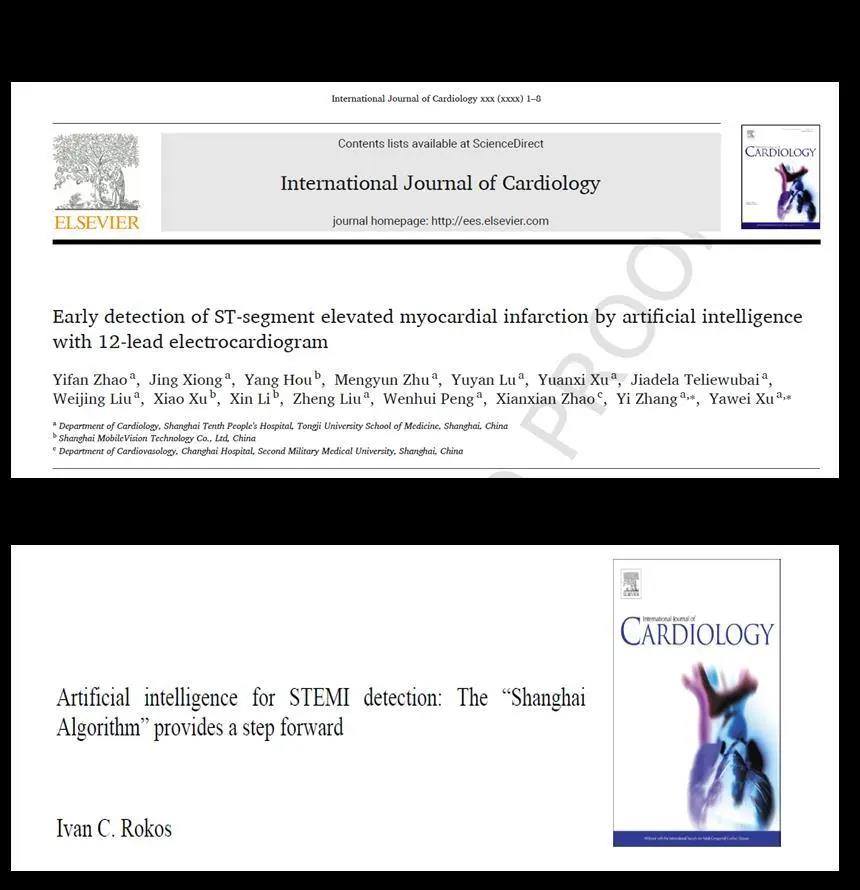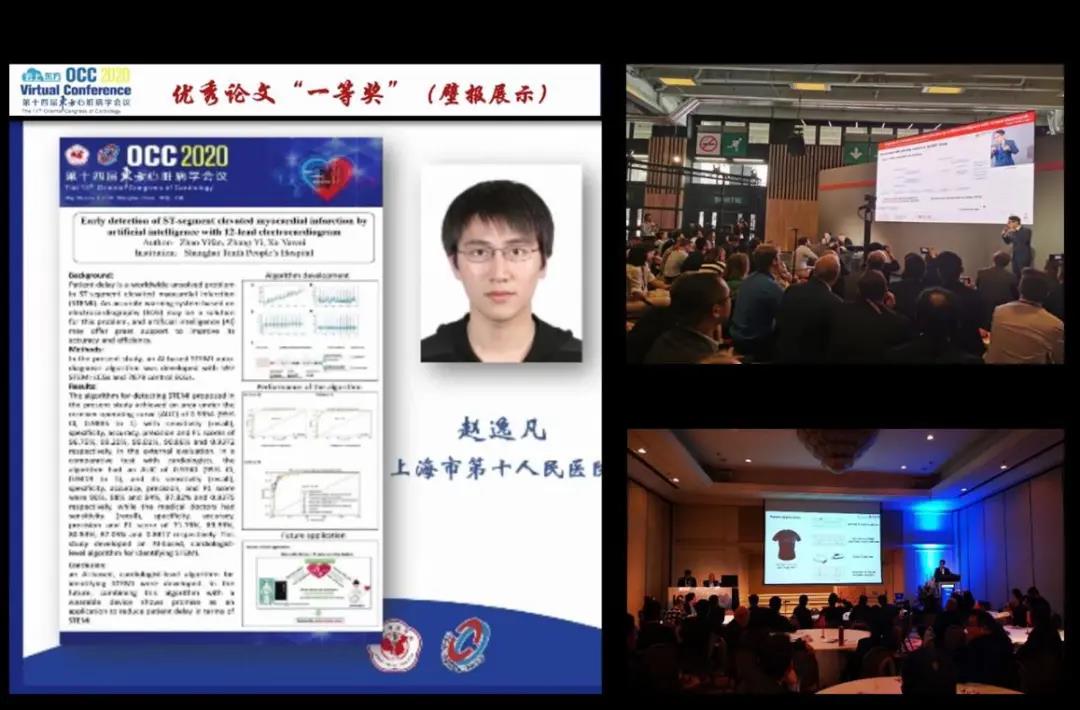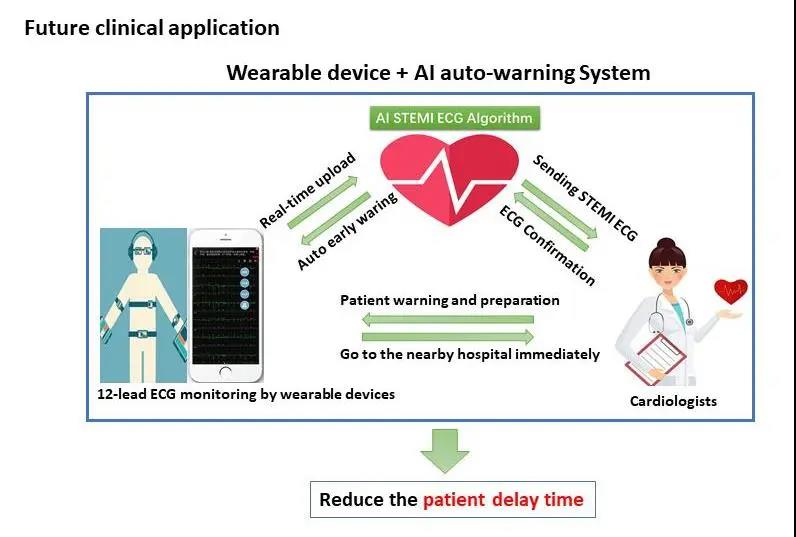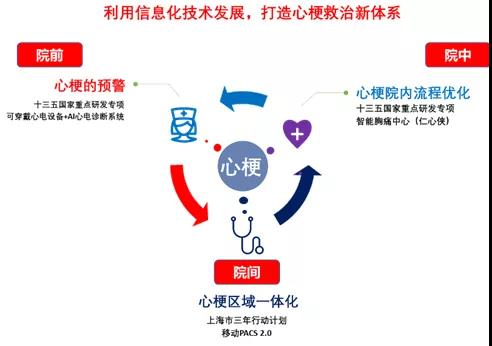The artificial intelligence algorithm developed by Xu Yawei team is more accurate than cardiologists in the field of interpreting the electrocardiogram of patients with acute ST-segment elevated myocardial infarction (STEMI). This algorithm made the automatic early warning of STEMI realizable. In the future, the algorithm can be embedded in wearable ECG monitoring equipment to achieve pre-hospital warning of acute myocardial infarction.
The world’s first STEMI early warning system based on a wearable 12-lead ECG device and artificial intelligence early warning software developed by professor Xu Yawei’s team from the Heart Center of the Tenth People’s Hospital affiliated to Tongji university has attracted the attention worldwide. The related paper was published in the International Journal of Cardiology. Professor Ivan Rokos, a well-known emergency cardiovascular expert at the University of California, Los Angeles, issued an editorial entitled "Artificial intelligence for STEMI detection: The Shanghai Algorithm' provides a step forward".

Previously, the artificial intelligence based system was launched at the Annual Conference of European Society of Cardiology in Paris, France, and the World Cardiovascular Innovation Conference in Tel Aviv, Israel in 2019, as the world's first wearable ECG monitoring device + artificial intelligence algorithm based STEMI warning system. The system has attracted great attention from the international cardiovascular community. Meanwhile, a poster entitled "Using artificial intelligence combined with 12-lead electrocardiogram to realize the early recognition of ST-segment elevation myocardial infarction" won the "First Prize" of the Excellent Paper of the Eastern Society of Cardiology conference.
In China, the mortality of cardiovascular diseases account for 44% of all adult deaths. Acute myocardial infarction is one of the most severe cardiovascular disease, with a mortality of 5% to 7%. Unlike other critical illnesses, the sooner patients with myocardial infarction are treated, the higher the survival rate. Therefore, shortening the treatment time of patients is the key factor to the treatment of acute myocardial infarction. However, there is still a lack of effective solutions to the problem of patient delay of myocardial infarction all over the world.

To solve the problem, Prof.Xu Yawei’s team and Shanghai medical vision technology co., Ltd carried out this research with the support of the key research and development projects of the Ministry of Science and Technology of the "13th Five-Year Plan", aiming to study the automatic interpretation of acute STEMI through ordinary 12-lead ECG by the artificial intelligence technology. The research team initially collected the ECGs of 1802 patients with suspected STEMI from the Tenth People’s Hospital of Tongji University and Changhai Hospital. All STEMI ECGs was confirmed by the “gold standard”—coronary angiography, and finally selected 667 STEMI cases with definitive "culprit vessel”. 7571 cases of normal and other types of abnormal ECGs were matched as the control group. Then, the team built an artificial intelligence algorithm for ST-segment elevation myocardial infarction through the Res-net artificial intelligence technique. Internal and external validation showed that the sensitivity and the specificity reached 96.8% and 99.2% respectively.
In order to further study the clinical applicability of the algorithm, the team further carried out a human-machine ECG interpretation competition. 50 STEMI ECGs and 50 ECGs without STEMI were interpreted by the algorithm and 15 cardiologists. The results showed that the sensitivity and specificity of this algorithm were 90% and 98%, respectively, while the sensitivity and specificity of the doctor's interpretation were only 71% and 89%. Especially in some patients with relatively insignificant ST-segment elevation, the advantage of artificial intelligence algorithm was more obvious. This result provides important software support for the automatic early warning of STEMI. In the future, embedding the algorithm into wearable ECG monitoring equipment is a very promising solution for prehospital early warning of acute myocardial infarction.
In the editorial, professor Ivan considered that this research has six major innovations: : 1) the STEMI+ ECGs were confirmed by prior Coronary Angiography as the gold standard, instead of just relying on “expert” review of each ECG ; 2) the ECGs were formatted digitally as Raw Data, not static images ; 3) the Control group had several important STE-mimics that often confuse frontline providers and older rule-based algorithms, including at least 260 ECGs with paced rhythm and 340 with LV hypertrophy; 4) a good balance of genders, with over 45% female in the STEMI cohort and over 60% female in controls; 5) culprit vessels in proportions that are similar to many real-world registries; and 6) the authors built and tested 102 different deep learning models in the Internal validation phase before selecting one for External validation.

In addition, Professor Ivan believes that past medical research related to artificial intelligence often requires a huge sample size. However, this study achieved a similar effect by using a relatively small sample size (only 667 samples of STEMI and 7571 control samples) through the "data amplification" technology, which is worthy of reference for future research in related fields. He hopes that the algorithm designed in this topic can be verified in other databases and clinical trials as soon as possible, so as to accelerate the advancement of the "Shanghai algorithm" to the clinic. He specifically pointed out that the AI-based STEMI diagnosis system is expected to change the global STEMI diagnosis and treatment system, and the "Shanghai algorithm" proposed by this research undoubtedly move a substantial step forward.
Professor Xu Yawei’s team has been deeply involved in the field of information-based treatment of myocardial infarction for more than 10 years, aiming to solve the problem of delayed treatment of patients with myocardial infarction in China through information-based methods. The Heart Center of the Shanghai Tenth people’s hospital affiliated to Tongji university has cooperated with a number of well-known high-tech companies over the years to jointly establish an artificial intelligence-based myocardial infarction treatment system that integrates wearable devices, artificial intelligence software and Internet of Things technology. The goal of the system is to optimize the entire rescue chain of acute myocardial infarction through an information system pre-hospital, in-hospital, and inter-hospitals, thereby shortening the patient's call for help, saving time, shortening the patient's hospitalization time , and improving the recovery of cardiac function to ultimately reduce the mortality of patients. At present, the team has achieved certain breakthroughs in this field: pre-hospital, automatic early warning of myocardial infarction will be realized through wearable equipment + artificial intelligence ECG diagnosis system; in the hospital, patients will be allowed to wear chest pain bracelets to achieve first treatment. After wearing the bracelets, the entire 90-minute golden rescue time is recorded automatically; Meanwhile, a regional integrated information treatment system is established to reduce the imbalance of the regional treatment level inter-hospital.

Source:https://en.tongji.edu.cn/info/1009/4286.htm
